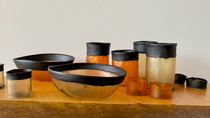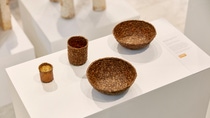Fantastic bioplastic

As the planet faces increasing challenges related to the human-driven climate crisis, it’s more important than ever that we search for sustainable eco-materials and creative solutions that do not harm our planet. We caught up with local Melbourne artist and experimental designer Jessie French, who is taking this challenge on head-first through her experimental bioplastic work, created using BASF’s natural beta-carotene.
After a decade of working in the arts, creatively directing and producing public programs, Jessie French decided to return to the books to study history and philosophy of science. Before that though, Jessie was invited to travel to Morocco on an art residency and used this opportunity to trace the supply chain of materials she had been experimenting with for use in making algae-based bioplastics.
During this trip, Jessie was able to explore the sustainability of harvesting and processing at the source of the majority of the world’s source of agar – the polymer extracted from specific red algae that Jessie uses to make bioplastic. Jessie consulted with independent marine biologists, environmental consultants, local harvesters and the directors of the world’s biggest agar-processing plant, to develop her understanding of the agar supply chain, and build confidence in its environmental profile. As an artist who had previously experimented with bioplastics, Jessie was inspired by the sustainability of agar as a polymer and the potential for continuing to work with it in her practice.
When COVID hit, Jessie found herself with some extra time on her hands, so continued experimenting with algae recipes and processes to find the perfect the molding technique for algae-based bioplastics. Jessie found BASF’s Betatene®, a naturally sources beta-carotene derived from algae, gave an “incredible orange or yellow colour” to the bioplastics she was creating and used Betatene in many of the beautiful, eco-friendly tableware vessels and lighting fixtures she was creating.
Jessie was recently invited to share these pieces in the ‘Form From: fungi/algae/dirt’ and ‘Sea At The Table’ exhibitions in Melbourne Design Week. Her stimulating creations embody the influences of consumption, ecology, and technology within a society driven by human-inflicted environmental conflicts and reflect her passion for experimenting with science and art to help find sustainable solutions. The algae-based bioplastic mediums are gaining traction as creative substitute materials that positively impact the environment, due to their organic and compostable nature.
As it is derived from algae, BASF’s Betatene is the most natural source of commercially available beta-carotene, which is why Jessie opted to use our product as a pigment for her homeware creations. By using the Betatene, she can use an algal pigment alongside an algal polymer to give the bioplastics that incredible trademark orange and yellow colour.
“The more I’ve worked with algae, the more I have researched it and come to appreciate so many kinds of macro and micro algae,” Jessie explained when asked why she chose to source from BASF. “Now I prefer to focus on algae-based materials that are sustainably grown and harvested. Where possible, I grow my own microalgae in my studio. It is also meaningful to me to know where my materials are coming from. Working with BASF allows me the opportunity to know where the algae has come from, see where it is grown, and know that it is responsibly harvested.”
Using eco-friendly materials for her designs is extremely important to Jessie, who recognises the importance of conscious consumption when combating climate change. Using such materials means her designs can be regeneratively recycled within kitchen homes, as they are able to breakdown in household compost bins over a 1-2-month period. “I have been focusing on homewares in these recent works because I’m interested in bottom-up approaches to change in how we deal with waste and petrochemical plastics,” she explained.
Her algae-based bioplastic tableware vessels and lighting fixtures, as featured in her current exhibition, are available for purchase at the gallery or via commission. Her work will also be available for public viewing over the next six months in a beautiful shopfront in Little Collins street, where she also has a range of bioreactors to grow various microalgae, including athrospira pantensis, which is used as a dark green pigment in her work.
“I want to continue to learn more about algae and empower others to consider growing some in their homes and workplaces as they would a plant,” revealed Jessie when asked what was next for her in the future. Educating others on the significance of sourcing environmentally friendly materials is important to Jessie, who will continue to promote sustainability through her future research and designs.
For more information on Jessie’s work, and where you can view it, please visit: https://linktr.ee/jessiefrench
